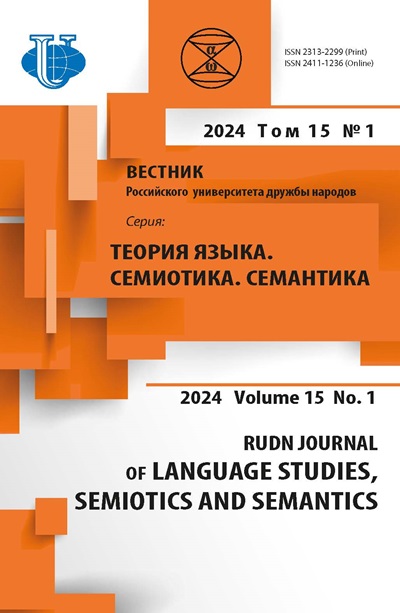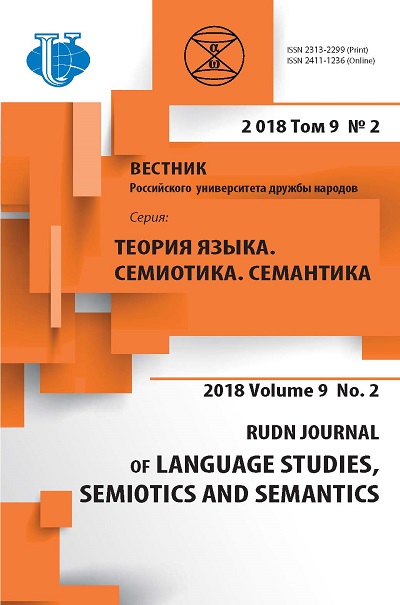FUNCTIONAL AND COMPARATIVE SEMANTICS
- Authors: Lazareva OV1
-
Affiliations:
- RUDN University
- Issue: Vol 9, No 2 (2018)
- Pages: 247-253
- Section: FROM THE EDITORIAL BOARD
- URL: https://journals.rudn.ru/semiotics-semantics/article/view/18741
Cite item
Full Text
Abstract
-
About the authors
O V Lazareva
RUDN University
Author for correspondence.
Email: lazareva_ov@rudn.university
Miklukho-Maklaya st., 6, Moscow, Russia, 117198
References
- Boldyrev, N.N. (2016). Cognitive schemes of language interpretation, Questions of cognitive linguistics, 4, 10—20.
- Wierzbicka, A. (1999). Semantics: Primes and Universals. Moscow.
- Kolesov, V.V. (2007). Russian mentality in language and text. SPb.: Petersburg Oriental Studies.
- Lyons, J. Linguistic semantics. Introduction / John Lyons; Trans. with English. IB Shatunovsky, V.V.
- Maslova, V.A. (2005). Cognitive linguistics. Moscow.
- Apresyan,Yu.D. (1993). Selected Works: In 2 volumes, Moscow: “Languages of Russian Culture”. Moscow.
- Gak, V.G. (1977). Comparative lexicology (on the basis of French and Russian). Moscow: International Relations.
- Kobozeva, I.M. (2000). Linguistic semantics. Moscow: Editorial URSS.
- Novikov, L.A. (2001). Selected works. Volume I. Problems of linguistic meaning. Volume II. Aesthetic aspects of language. Moscow: Publishing House of the Peoples Friendship University of Russia.
- Popova, Z.D. & Sternin, I.A. (2003). Essays on cognitive linguistics. Voronezh: Istoki.
- Shmelyov, D.N. (2002). Selected works on the Russian language. Moscow: Languages of Slavic Culture.
- Krysin, L.P. (1989). Sociolinguistic Aspects of the Study of the Modern Russian Language. Moscow.
- Telia, V.I. (1986). Connotative aspect of semantics of nominative units. Moscow: Nauka.
- Karasik, V.I. (2002). Language Circle: Personality, Concepts, Discourse. Volgograd: The Change.
- Kubryakova, E.S. (2004). Language and knowledge. On the way of getting knowledge of the language: parts of speech from the cognitive point of view. The role of language in the knowledge of the world. Ros. Academy of Sciences. Institute of Linguistics. Moscow: Languages of Slavic Culture.
- Lakoff, J. & Johnson, M. (2004). Metaphors that we live in. Moscow: Editorial URSS.
- Stepanov, Yu.S. (2001). In the world of semiotics In Semiotics: Anthology. Moscow. 5—42.
- Popova, Z.D. & Sternin, I.A. (2007). Semantico-cognitive analysis of the language. Voronezh: Istoki.
- Tarasov, E.F. (2012). The problem of analyzing the content of universal values (draft), Questions of psycholinguistics,1(15), 9—17.
- Ufimtseva, N.V. (2011). Language consciousness: dynamics and variability. Moscow, Kaluga: Institute of Linguistics RAS.
- Karaulov, Yu.N. (Ed). (2002). Russian author lexicography of the XIX—XX centuries. Anthology. Moscow.
- Karaulov, Yu.N. & Filippovich, Yu.N. (2009). Linguocultural consciousness of the Russian language personality. Modeling the state and functioning. Moscow: Azbukovnik.













